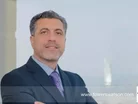Q&A: Behind the Scenes with the Managing Director of Towers Watson

Dr Ahmad Waarie is the Managing Director of HR experts Towers Watson, with presence across the globe and more than 14,000 associates.
During his five years with Towers Watson, Ahmad has been instrumental to the success of various strategic HR and transformation projects in the region for key clients across various sectors including oil and gas, financial services, telecoms and the public sector.
Prior to joining Towers Watson, Ahmad was the Director of Strategic Human Resources at The Executive Office/Council of Dubai where he championed the strategic transformation of the Dubai Government through the introduction of high-profile and complex projects and initiatives.
He also served as the HR Advisor for the UAE Prime Minister’s Office and assisted in the development of high profile strategic projects.
In his 20+ years of experience and prior to coming to the Gulf region, Ahmad has worked in multinational organisations across four continents and has a vast experience in all the areas and challenges in the HR field. We go backstage to find out more about the man behind the MD.
BR EME: Where were you educated? What did you enjoying learning the most/least?
AW: I have studied in the United States and Australia and my specialization was in Economics, which I have enjoyed, especially microeconomics. This subject mainly gave me a good understanding of how things work, as well as getting a grasp on human behaviour and the economic reasons behind it.
My interest in the human factor led me to get my postgraduate degree is in Human Resources, since I always found studying people the most fascinating thing in life.
What lead you into the world of Human Resources?
Pure coincidence!! My best friends at college got offers for HR roles in multinational companies and I joined them as I was interested in what they were doing.
Are there challenges with HR in the Middle East which do not exist in other parts of the world?
There are always region specific challenges when it comes to people relating back to the overall political, economic and cultural environment.
However, the main challenge in the Middle East is having to deal with the unique international and multinational workforce that exists in the region.
Communicating and taking on board ideas from employees is no doubt an important part of your work. Have you ever received any bizarre or out of the ordinary ideas?
All the time!!! Someone suggested providing bicycles for employees to travel to work, which was brilliant, especially with the 40 degrees temperature outdoors in the summer.
Who has been your biggest influence during your career?
My biggest influence was my first boss, who was brought out from retirement from Canada and, even though he was 65 years old, he had more energy and motivation than any of the young employees around. I picked from him my motivation that shaped my career until this day.
Define success.
Overachieving and keep raising the bar, but with a balanced commitment to family and personal life.
What was the best and worst piece of advice you ever received?
The best piece of advice came from my mother while young: to always be honest. The worst piece of advice is to always follow the rules, which kill innovation.
How important is striking a work and social life balance?
Striking work and life balance is critical to being successful in both. We have to assume our responsibility for everything we do and leave positive marks both as professionals, but also as human beings.
What do you do in your free time?
I don’t have a lot of free time, but I try as much as possible to spend enough time with my children while they are still growing.
What advice would you give to young entrepreneurs?
Know your dream, do your homework and never give up.
- Leadership development remains critical to successLeadership & Strategy
- Five Minutes With: Björn Dufwenberg, MD at Strat7 AdvisoryLeadership & Strategy
- Building bridges between management and productivityLeadership & Strategy
- How analogous inspiration can solve your strategic deadlockLeadership & Strategy



